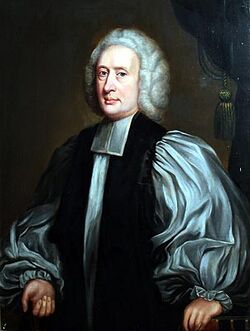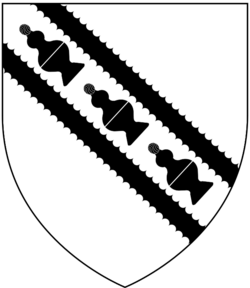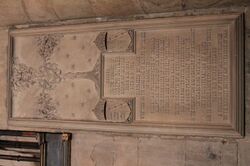Biography:Joseph Butler
Joseph Butler | |
|---|---|
| Bishop of Durham | |
 | |
| Diocese | Durham |
| In office | 1750–1752 |
| Predecessor | Edward Chandler |
| Successor | Richard Trevor |
| Other posts | Bishop of Bristol (1738–1750) Dean of St Paul's (1740–1750) |
| Orders | |
| Ordination | 26 October 1718 (deacon) 21 December 1718 (priest) by William Talbot |
| Consecration | 3 December 1738 |
| Personal details | |
| Born | 18 May 1692 Wantage, Berkshire, England |
| Died | 16 June 1752 (aged 60) Bath, Somerset, Great Britain |
| Buried | 20 June 1752,[1] Bristol Cathedral[2] |
| Nationality | English (later British) |
| Denomination | Presbyterian Anglican (after 1714) |
| Residence | Rosewell House, Kingsmead Square, Bath (at death) |
| Parents | Thomas Butler[1] |
| Profession | Theologian, apologist, philosopher |
| Sainthood | |
| Feast day | 16 June (commemoration) Philosophy career |
| Education | Tewkesbury Academy Oriel College, Oxford |
| Era | 18th-century philosophy |
| Region | Western philosophy |
| School | Empiricism, Christian philosophy |
Main interests | Theology |
Notable ideas | Criticism of deism |
Influences
| |
Influenced
| |
Joseph Butler (18 May 1692 – 16 June 1752) was an English Anglican bishop, theologian, apologist, and philosopher. He was born in Wantage in the England county of Berkshire (now Oxfordshire). He is known, among other things, for his critique of Deism, Thomas Hobbes's egoism, and John Locke's theory of personal identity.[3] Butler influenced many philosophers and religious thinkers, including David Hume, Thomas Reid, Adam Smith,[4] Henry Sidgwick,[5] John Henry Newman,[6] and C. D. Broad,[7] and is widely considered "as one of the preeminent English moralists."[8] He also played an important, though under appreciated, role in the development of eighteenth-century economic discourse, greatly influencing the Dean of Gloucester and political economist Josiah Tucker.[9]
Biography

Early life and education
The son of a Presbyterian linen-draper, he was destined for the ministry of that church and, along with future archbishop Thomas Secker, entered Samuel Jones's dissenting academy at Gloucester (later Tewkesbury) for that purpose. While there, he entered into a secret correspondence with the distinguished Anglican theologian and philosopher Samuel Clarke. In 1714, Butler decided to enter the Church of England, and went to Oriel College, Oxford. He received his Bachelor of Arts in 1718 and later proceeded Doctor of Civil Law on 8 December 1733.[1]
Church career
Butler was ordained a deacon on 26 October 1718 by William Talbot, Bishop of Salisbury, in his Bishop's Palace, Salisbury, his palace chapel[11] and a priest on 21 December 1718 by Talbot at St James's Church, Piccadilly.[1] After holding various other high positions, he became rector of the rich living of Stanhope, County Durham.
In 1736 he was made the head chaplain of George II's wife Caroline, on the advice of Lancelot Blackburne. He was nominated Bishop of Bristol on 19 October 1738 and consecrated a bishop on 3 December 1738 at Lambeth Palace chapel. Remaining Bishop of Bristol, Butler was installed Dean of St Paul's on 24 May 1740; he kept that office until his translation to Durham.[1] He is said (apocryphally) to have declined an offer to become the archbishop of Canterbury in 1747 but was appointed Clerk of the Closet to the king in 1746 (until 1752). He was translated to Durham by the confirmation of his election to that See in October 1750; he was then enthroned by proxy on 9 November 1750.[1] He is buried in Bristol Cathedral.
Death and legacy
Butler died in 1752 at Rosewell House, Kingsmead Square in Bath, Somerset.[12] His admirers praise him as an excellent man, and a diligent and conscientious churchman. Though indifferent to general literature, he had some taste in the fine arts, especially architecture.
Joseph is remembered in the Church of England with a commemoration on 16 June.[13]
He has his own collection of manuscripts (e.g. Lectionary 189).
Philosophy

Attack on deism
During his lifetime and for many years after his death, Butler was most famous for his Analogy of Religion, Natural and Revealed (1736), which, according to historian Will Durant, "remained for a century the chief buttress of Christian argument against unbelief."[14] English deists such as John Toland and Matthew Tindal had argued that nature provides clear evidence of an intelligent designer and artificer, but they rejected orthodox Christianity because of the incredibility of miracles and the cruelties and contradictions contained in the Bible.
Butler's Analogy was one of many book-length replies to the deists, and it was long widely believed to be the most effective. Butler argued that nature itself was full of mysteries and cruelties, and thus shared the same alleged defects as the Bible. Arguing on empiricist grounds that all knowledge of nature and human conduct is merely probable, Butler then appealed to a series of patterns ("analogies") observable in nature and human affairs, which, in his judgment, make the chief teachings of Christianity likely true.
Butler's jiu-jitsu-like argumentative strategy was unusual and risky. Arguing that "because nature is a mess of riddles, we cannot expect revelation to be any clearer"[15] obviously invited the retort that then both deism and Christianity were irrational. Today, Butler's Analogy is "now largely of historical interest,"[16] but his claim that probability is the guide to life would be endorsed by many contemporary philosophers.
Ethics and moral psychology
A Butler scholar, Stephen Darwall, wrote: "Probably no figure had a greater impact on nineteenth-century British moral philosophy than Butler."[17] Butler's chief target in the Sermons was Thomas Hobbes and the egoistic view of human nature he had defended in Leviathan (1651). Hobbes was a materialist who believed that science reveals a world in which all events are causally determined and in which all human choices flow unavoidably from whatever desire is most powerful in a person at a given time. Hobbes saw human beings as being violent, self-seeking, and power-hungry. On such a view, there was no place for genuine altruism or benevolence or any conception of morality as traditionally conceived.[18]
In the Sermons, Butler argues that human motivation is less selfish and more complex than Hobbes claimed. Butler maintains that the human mind is an organized hierarchy of a number of different impulses and principles, many of which are not fundamentally selfish. On the ground floor, so to speak, is a wide variety of particular emotions, appetites, and affections, such as hunger, anger, fear, and sympathy. They, in properly organized minds, are under the control of two superior principles: self-love (a desire to maximize one's own long-term happiness) and benevolence (a desire to promote the general happiness). The more general impulses are in turn subject to the highest practical authority in the human mind: moral conscience. Conscience, Butler claims, is an inborn sense of right and wrong, an inner light and monitor, received from God.[19] Conscience tells one to promote both the general happiness and personal happiness. Experience informs that the two aims largely coincide in the present life. For many reasons, Butler argues, unethical and self-centered people who care nothing for the public good are usually not very happy.
There are, however, rare cases where the wicked seem (for a time) to prosper. A perfect harmony of virtue and self-interest, Butler claimed, is guaranteed only by a just God, who, in the afterlife, rewards and punishes people as they deserve.[20]
Criticism of Locke's theory of personal identity
In Appendix 1 of the Analogy, Butler offers a famous criticism of John Locke's influential theory of "personal identity", an explanation of what makes someone the "same person" from one time to the next, despite all the physical and psychological changes experienced over that period. Locke claimed that personal identity is not from having the same body or the same soul but from having the same consciousness and memory. According to Locke, memory is the "glue" that ties the various stages of our life together and constitutes sameness of person.
More precisely, Locke claims, Person A is the same person as Person B just in case A and B share at least some of the same memories. Butler pointed out that the way "real" memories can be distinguished from false ones is that it was people who had the experiences that are truly remembered. Thus, Butler claimed, memory presupposes personal identity and so cannot constitute it.[21]
Veneration
Butler is honoured together with George Berkeley with a feast day on the liturgical calendar of the Episcopal Church (USA) on 16 June.
Styles and titles
- 1692–1718: Joseph Butler Esq.
- 1718–1733: The Reverend Joseph Butler
- 1733–1738: The Reverend Doctor Joseph Butler
- 1738–1752: The Right Reverend Doctor Joseph Butler
Publications
- Several letters to the Reverend Dr. Clarke, 1716, 1719, 1725 – reprinted in Volume 1 of Gladstone's edition of Butler's works
- Fifteen sermons preached at the Rolls Chapel, 1726, 1729, 1736, 1749, 1759, 1765, 1769, 1774, 1792
- The Analogy of Religion, Natural and Revealed, to the Constitution and Course of Nature, 1736, 1740, 1750, 1754, 1764, 1765, 1771, 1775, 1785, 1788, 1791, 1793, 1796, 1798
- A sermon preached before the Incorporated Society for the Propagation of the Gospel in Foreign Parts, 1739
- A sermon preached before the Right Honourable the Lord-Mayor, 1740
- A sermon preached before the House of Lords, 1741, 1747
- A sermon preached in the parish-church of Christ-Church, London, 1745
- A sermon, preached before His Grace Charles Duke of Richmond, Lenox, and Aubigny, president, 1748, 1751
- Six sermons preached upon publick occasions, 1749
- A catalogue of the libraries [...], 1753
- A charge delivered to the clergy at the primary visitation of the diocese of Durham, 1751, 1786 – reprinted in Volume 2 of Gladstone's edition of Butler's works
See also
Notes
- ↑ 1.0 1.1 1.2 1.3 1.4 1.5 "Butler, Joseph". Oxford Dictionary of National Biography (online ed.). Oxford University Press. doi:10.1093/ref:odnb/4198. (Subscription or UK public library membership required.)
- ↑ 1911 Encyclopædia Britannica
- ↑ "Joseph Butler (1692–1752)". http://www.iep.utm.edu/butler/.
- ↑ White (2006), §8.
- ↑ J. B. Schneewind, Sidgwick's Ethics and Victorian Moral Philosophy. Oxford: Clarendon Press, 1978, p. 47.
- ↑ John Henry Cardinal Newman, Apologia Pro Vita Sua. New York: Modern Library, 1950, p. 41. Originally published in 1946.
- ↑ C. D. Broad, Five Types of Ethical Theory. Paterson, NJ: Littlefield, Adams, and Co., 1959, p. 83. Originally published in 1930.
- ↑ James C. Livingston, Modern Christian Thought. New York: Macmillan, 1971, p. 47.
- ↑ Peter Xavier Price, 'LIBERTY, POVERTY AND CHARITY IN THE POLITICAL ECONOMY OF JOSIAH TUCKER AND JOSEPH BUTLER', Modern Intellectual History (2017), 1–30. doi:10.1017/S1479244317000518. [1]
- ↑ As seen on his monument in Durham Cathedral (same arms as Butler, Earl of Lanesborough (Burke, Bernard, The General Armory of England, 1884, p.153))
- ↑ Template:CCEd
- ↑ "Rosewell House". Images of England. English Heritage. http://www.imagesofengland.org.uk/Details/Default.aspx?id=442757.
- ↑ "The Calendar" (in en). https://www.churchofengland.org/prayer-and-worship/worship-texts-and-resources/common-worship/churchs-year/calendar.
- ↑ Will and Ariel Durant, The Age of Voltaire. New York: Simon & Schuster, 1965, p. 125.
- ↑ Livingston, Modern Christian Thought, p. 51.
- ↑ Stephen L. Darwall, "Introduction" to Joseph Butler, Five Sermons. Indianapolis: Hackett, 1983, p. 1.
- ↑ Darwall, "Introduction<" p. 3.
- ↑ Darwall, "Introduction," p. 1.
- ↑ Butler, Five Sermons, p. 37.
- ↑ Butler, Five Sermons, p. 45.
- ↑ Joseph Butler, The Analogy of Religion. Cincinnati: Jennings and Graham, 1847. p. 324.
References
- William Lucas Collins, Butler, Philosophical Classics for English Readers, Blackwood, 1881.
- "Butler, Joseph." Encyclopædia Britannica, 1911 edition.
- White, David E. "Joseph Butler," Internet Encyclopedia of Philosophy, J. Fieser & B. Dowden (eds.), 2006.
- Garrett, Aaron Joseph Butler's Moral Philosophy, Stanford Encyclopedia of Philosophy 2012.
Further reading
- Austin Duncan-Jones Butler's Moral Philosophy Penguin 1952.
- Ramm, Bernard, "Joseph Butler," Varieties of Christian Apologetics: An Introduction to the Christian Philosophy of Religion, Baker Book House, Grand Rapids, 1962 pp. 107–124.
- Rurak, James, "Butler's Analogy: A Still Interesting Synthesis of Reason and Revelation," Anglican Theological Review 62 (October), 1980 pp. 365–381.
- Brown, Colin, Miracles and the Critical Mind, Paternoster, Exeter UK/William B. Eerdmans, Grand Rapids, 1984.
- Craig, William Lane, The Historical Argument for the Resurrection of Jesus During the Deist Controversy, Texts and Studies in Religion, Volume 23. Edwin Mellen Press, Lewiston, New York & Queenston, Ontario, 1985.
- Penelhum, Terence, Butler, New York: Routledge, 1985.
External links
| Wikisource has the text of the 1911 Encyclopædia Britannica article Butler, Joseph. |
- Contains Correspondence with Clarke, three episodes from Analogy of Religion, and five of the Fifteen Sermons, all lightly edited for easier reading
- "Joseph Butler". Internet Encyclopedia of Philosophy. http://www.iep.utm.edu/butler.
- Works by Joseph Butler at Project Gutenberg
- Works by Joseph Butler at LibriVox (public domain audiobooks)

- Error in Template:Internet Archive author: Joseph Butler doesn't exist.
| Preceded by Thomas Gooch |
Bishop of Bristol 1738–1750 |
Succeeded by John Conybeare |
| Preceded by Francis Hare, Bishop of Chichester |
Dean of St Paul's 1740–1750 |
Succeeded by Thomas Secker, Bishop of Oxford |
| Preceded by Edward Chandler |
Bishop of Durham 1750–1752 |
Succeeded by Richard Trevor |
